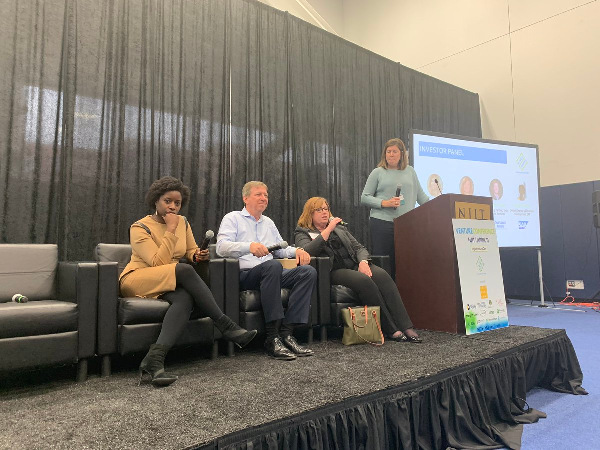Investor Panelists at NJ Tech Council Venture Conference Answer Startup Founders’ Questions
The 2019 NJ Tech Council Venture Conference, which took place on April 11 at NJIT’s Wellness and Events Center, in Newark, showcased dozens of New Jersey startups, as well as other startups from nearby states.
Following about 50 90-second business pitches from founders and key associates ― many of whom had also presented their startups to hundreds of attendees in the adjoining hall ― a panel discussion featuring four seasoned investors got underway.
Instead of sticking with the usual format of having the moderator ask the questions, the panel participants agreed to field questions from the audience, which made for a nice, participatory twist. The panelists included:
Kelly Ford Buckley, a partner at Edison Partners, a Princeton-based growth equity investment firm founded in 1986. As part of the Edison Edge platform, she helps portfolio companies accelerate and scale their growth. Ford also serves as a board or investment team member of several portfolio companies. She has been recognized as one of the “Best 50 Women in Business” by NJBIZ.
Kathleen Coviello, vice president at the New Jersey Economic Development Authority, oversees its Technology & Life Sciences Division, with the responsibility of assisting early-stage companies and investors across the state and for delivering various Edison Innovation Fund products to this community. She spent 17-plus years in the banking industry.
Stephen Socolof, managing partner at Tech Council Ventures (New Brunswick), has been a technology investor for two decades. He is also a cofounder and managing partner of New Venture Partners (Murray Hill), which teams up with corporations to commercialize internally developed innovations as spinout ventures. Prior to New Venture Partners, he led an internal incubator for Lucent Technologies, using an alternative venture-capital approach to bring Bell Labs technologies to market quickly.
Kange Kaneene, senior director of business development at SAP Ariba (Palo Alto, Calif.), identifies seed and early-stage startup businesses for SAP Ariba to invest in, thereby further expanding its large international ecosystem. She also works to expand SAP Ariba’s ecosystem by identifying acquisition targets and building strategic partnerships with complementary tech/service organizations. Kaneene occasionally serves as a panelist at various industry events.
Some highlights from the panel Q&A:
- Addressing an audience member who asked about the ideal size of
a pitch deck for a meeting with prospective funding sources (such as venture
capital firms), the panelists noted that the size of your PowerPoint is not as
important as the quality of the content. You should probably start off with a
one-pager that is concise and tightly structured before sending your full deck.
During this part of the discussion, the panelists also made the following
points:
- It’s much better to come with a “warm” introduction. The ideal situation is to be recommended by someone the VC knows and trusts.
- There could be something in the founder’s background that will convince investors that he/she is the right individual to lead the business through years of fast, exponential growth ― which is what VCs are ultimately seeking.
- The pitch should thus emphasize anything in the founder’s background, such as successful past exits, that will give VCs the impression that he/she would be a good fit.
- The deck size may vary depending on the industry.
- Responding to a question about teams, the panelists said that the right team can overcome extreme business challenges and “near-death” experiences that occasionally crop up. So, having the right team is more important than just having the right idea or business plan.
- One audience member wanted to know if various industry- and company-specific incubators/accelerators are a threat to VCs. The panelists seemed to believe that incubators/accelerators can be viewed as playing a complementary role for early-stage businesses, making them more investable by the time they are ready to seek capital from professionals.
For example, they noted that being nurtured by a large corporate incubator early on can provide a startup with a wealth of resources that its founders could never dream of having otherwise, such as access to supply-chain and management expertise.
- Responding to a question about competition, the panelists agreed that it’s a good thing when venture capital companies have strong competition for attractive deals. VCs often syndicate deals, bringing in other investors with whom they might have preexisting relationships or seeking other sources of capital.
- Asked about the role of universities in incubating young companies, the panelists stated that universities can make good, symbiotic partners for early-stage businesses (student-led or otherwise) due to multiple factors, such as their ability to offer entrepreneurs low-cost labor, lab space and access to professors and analytical teams.




